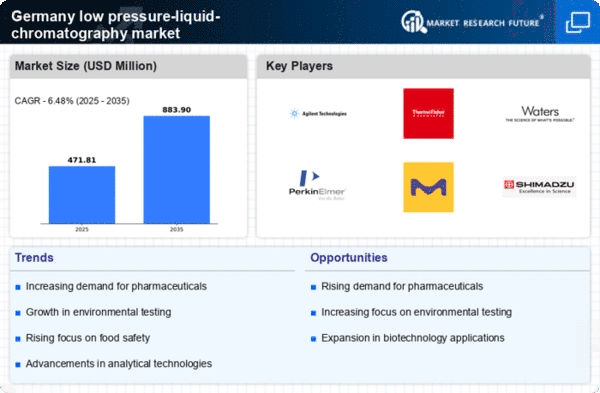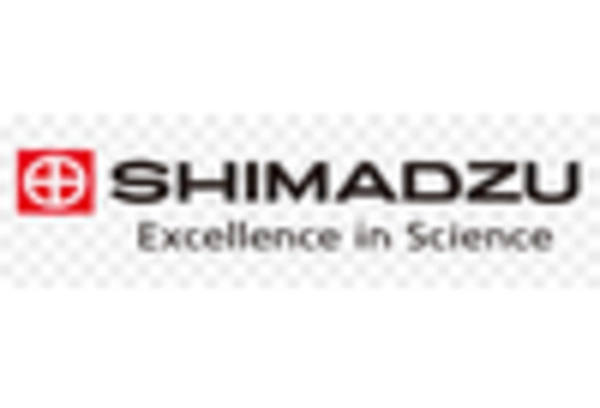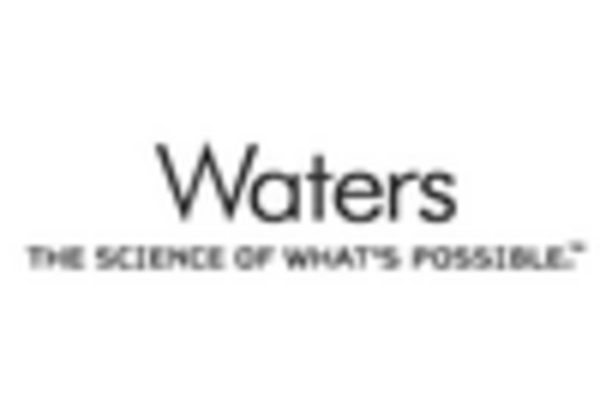Growing Environmental Concerns
Environmental concerns are becoming increasingly prominent in Germany, leading to a heightened focus on sustainable practices within the low pressure-liquid-chromatography market. Regulatory bodies are imposing stricter guidelines on waste management and emissions, prompting industries to adopt greener analytical methods. The low pressure-liquid-chromatography market offers solutions that minimize solvent usage and reduce hazardous waste, aligning with these environmental objectives. In 2025, it is anticipated that the demand for eco-friendly chromatography solutions will rise by 8%, as companies seek to comply with new regulations. This shift towards sustainability not only enhances the market's reputation but also attracts investments aimed at developing innovative, environmentally friendly technologies. Consequently, the low pressure-liquid-chromatography market is likely to thrive in this evolving landscape.
Expansion of Food Safety Regulations
The expansion of food safety regulations in Germany is significantly impacting the low pressure-liquid-chromatography market. As consumer awareness regarding food quality and safety increases, regulatory agencies are enforcing stricter standards for food testing and analysis. The low pressure-liquid-chromatography market provides essential tools for detecting contaminants and ensuring compliance with these regulations. In 2025, the food safety testing market in Germany is projected to grow by 7%, driven by the need for reliable analytical methods. This growth presents a substantial opportunity for low pressure-liquid-chromatography solutions, as food manufacturers and testing laboratories seek to implement effective quality control measures. As a result, the low pressure-liquid-chromatography market is likely to see increased adoption in the food industry, further solidifying its role in maintaining food safety.
Rising Demand in Pharmaceutical Sector
The pharmaceutical sector in Germany is experiencing a notable increase in demand for low pressure-liquid-chromatography market solutions. This growth is primarily driven by the need for efficient drug development and quality control processes. As pharmaceutical companies strive to meet stringent regulatory standards, the adoption of advanced chromatographic techniques becomes essential. In 2024, the pharmaceutical industry in Germany was valued at approximately €50 billion, with a projected growth rate of 5% annually. This trend indicates a robust market for low pressure-liquid-chromatography applications, as they play a crucial role in ensuring the purity and efficacy of pharmaceutical products. Consequently, the low pressure-liquid-chromatography market is likely to benefit from this rising demand, as companies invest in innovative technologies to enhance their analytical capabilities.
Increased Research Activities in Academia
Germany's academic institutions are increasingly engaging in research activities that require sophisticated analytical techniques, thereby driving the low pressure-liquid-chromatography market. Universities and research centers are focusing on various fields, including biochemistry, environmental science, and food safety, where chromatography is essential for analysis. In 2025, research funding in Germany is expected to reach €20 billion, with a significant portion allocated to life sciences and analytical chemistry. This influx of funding suggests a growing emphasis on research and development, which in turn fuels the demand for low pressure-liquid-chromatography systems. As academic institutions seek to publish high-quality research, the need for reliable and efficient chromatographic methods becomes increasingly critical, positioning the low pressure-liquid-chromatography market for substantial growth.
Technological Innovations in Instrumentation
The low pressure-liquid-chromatography market is witnessing a wave of technological innovations in instrumentation, which is likely to enhance its appeal in Germany. Advances in automation, data analysis, and miniaturization are making chromatography systems more efficient and user-friendly. For instance, the introduction of high-throughput systems allows laboratories to conduct multiple analyses simultaneously, significantly reducing time and costs. In 2025, the market for chromatography instruments in Germany is projected to grow by 6%, driven by these technological advancements. Furthermore, the integration of artificial intelligence in data interpretation is expected to streamline workflows and improve accuracy. As laboratories increasingly adopt these innovations, the low pressure-liquid-chromatography market is poised to expand, catering to the evolving needs of various industries.
















